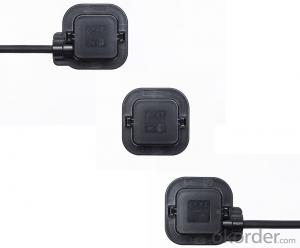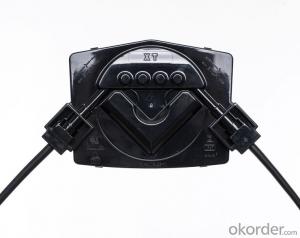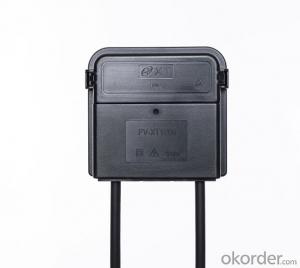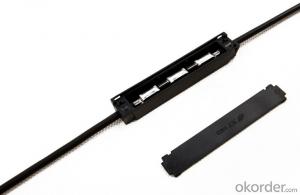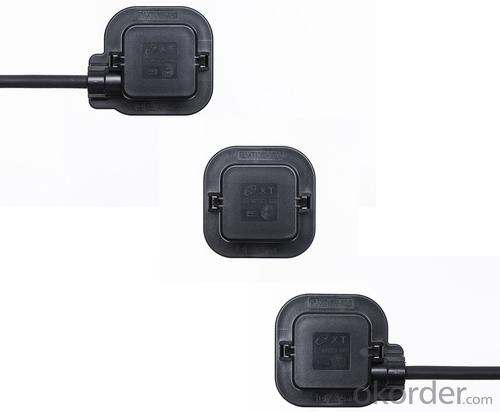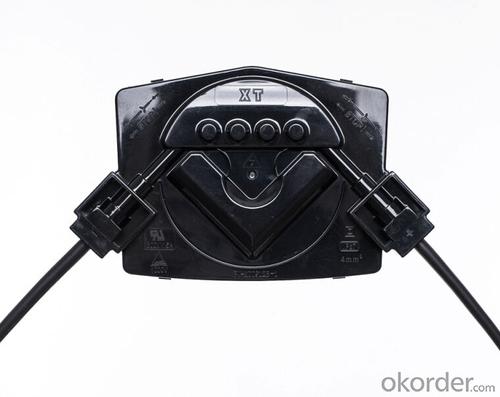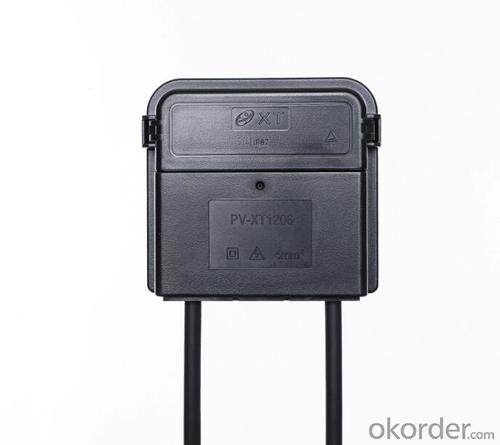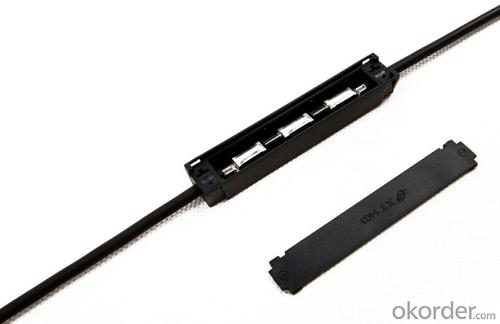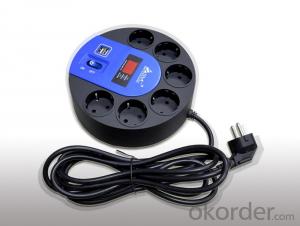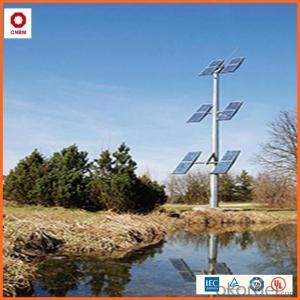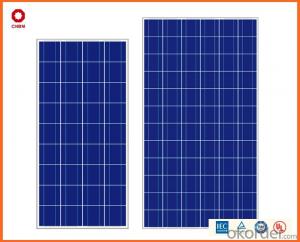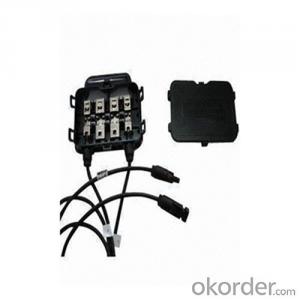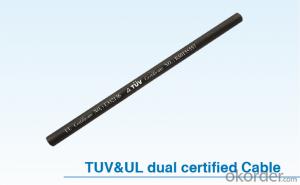Solar Energy Systems Ulverston PV Junction Box PV-1302 Split Design for Shortened Wiring - TUV, UL, ISO9001 Certified
- Loading Port:
- Guangzhou
- Payment Terms:
- TT OR LC
- Min Order Qty:
- 3000 pc
- Supply Capability:
- 3000000 pc/month
OKorder Service Pledge
OKorder Financial Service
You Might Also Like
Feature
a. split design, shortening wiring
b.use glue, excellent heat output
c. way of outlet, down and side optional
d.suitable for application of BIPV
Product description
1. All the connection made by double fixed connection low power loss
2. With the capacity of anti-aging and resistance to ultraviolet radiation on the outer cover with excellent box design with good thermal dissipation
3. Demonstrating safe, realiable and excellent lasting functionality, applicable in harsh outdoors working ambient
4. Big variety for choices,1 rail ,2 rail,3 rail,4 rail,5 rail,6 rail.mini junction box and solar junction box for solar street light
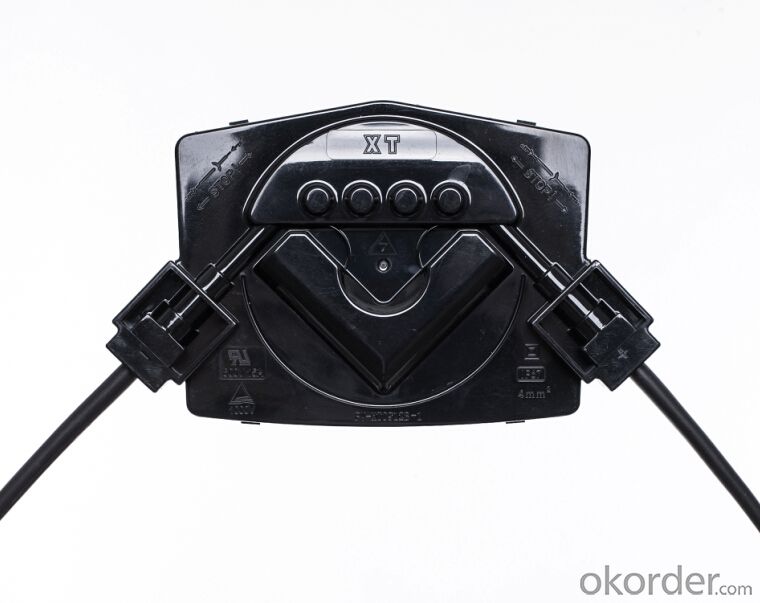
Item | Data |
Terminals for Ribbons | 2 |
Rated Current | 12A/15A |
Rated Voltage | 1000V/1500V |
Dimension | 67.4*51*15.5mm |
Temperature | -40℃~+85℃ |
Size of Cables | 4 mm2/12AWG |
Size of Ribbons | W(6±2mm)*T(0.3±0.15mm) |
Protection Degree | IP67 |
Flammability Class | V-0 |
FAQ
1. How long will my inquiry get response?
Your inquiry related to our products or prices will be replied within 24 hours.
2. Can I get professional service and suggestion?
Well-trained and experienced staffs to answer all your questions in fluent English.
3. Do you accept OEM or customized design?
OEM & ODM, any your customized lightings we can help you to design and put into product.
4. What if I need specific design?
Distributorship are offered for your unique design and some our current models.
- Q: How does the angle and orientation of solar panels affect their efficiency?
- The angle and orientation of solar panels greatly impact their efficiency. Solar panels should be angled and oriented in a way that maximizes their exposure to sunlight throughout the day. If the panels are not angled correctly, they may not receive the maximum amount of sunlight, leading to reduced efficiency. Additionally, the orientation of the panels, whether they are facing south or not, plays a crucial role in capturing sunlight. A south-facing orientation is typically the most effective as it allows the panels to receive the most direct sunlight, optimizing their efficiency.
- Q: Can solar energy systems be installed on flat surfaces?
- Yes, solar energy systems can be installed on flat surfaces. While it is more common to install solar panels on angled surfaces to maximize sunlight absorption, flat surfaces can still be utilized for solar energy systems. Mounting systems can be used to tilt the panels towards the sun and optimize energy production even on flat surfaces.
- Q: What is the role of voltage regulators in a solar energy system?
- The role of voltage regulators in a solar energy system is to ensure that the voltage output from the solar panels remains steady and within the desired range. They regulate and stabilize the voltage to prevent any damage to the connected devices or the system itself. Additionally, voltage regulators help optimize the efficiency of the system by matching the voltage output to the specific requirements of the load or battery being charged.
- Q: Are there any insurance considerations for solar energy systems?
- Solar energy systems have several insurance considerations to take into account. The first and most important consideration is to ensure that the system is sufficiently insured against damage or loss. This typically involves obtaining property insurance coverage that specifically includes the solar panels and related equipment. In addition, liability insurance is crucial for solar energy systems. This insurance protects against any damages or injuries that may arise from the system, such as property damage or personal injury caused by a falling panel. The liability coverage should be enough to cover the potential risks and liabilities associated with installing, operating, and maintaining the system. It is also important to think about business interruption insurance. This type of coverage provides financial protection in case the solar energy system becomes damaged or malfunctions, resulting in a loss of power production and revenue. Business interruption insurance can help cover the costs of repairs, replacement equipment, and any income lost during the downtime. Lastly, it is advisable to seek guidance from an insurance professional who specializes in renewable energy systems. They can ensure that all potential risks and exposures are adequately covered. They can also help identify any additional insurance considerations specific to the solar energy system and provide guidance on the appropriate types and levels of coverage needed to protect the investment effectively.
- Q: How much sunlight do solar panels need to generate electricity?
- Solar panels need direct sunlight for at least 5-6 hours per day to generate a significant amount of electricity.
- Q: Are there any disadvantages of using solar energy?
- Yes, there are a few disadvantages of using solar energy. Firstly, the initial installation cost of solar panels can be quite expensive. Additionally, solar panels can take up a significant amount of space, especially when considering large-scale installations. Furthermore, solar energy generation is dependent on sunlight availability, meaning it may not be as reliable during cloudy days or at night. Finally, the production and disposal of solar panels can have environmental impacts, as they involve the use of certain chemicals and materials.
- Q: Can solar energy systems be used in powering swimming pools or spas?
- Yes, solar energy systems can be used to power swimming pools or spas. Solar panels can be installed to capture sunlight and convert it into electricity, which can then be used to run the pool's pump, heater, and other equipment. This helps to reduce energy costs and reliance on traditional power sources.
- Q: What is the impact of snow cover on the performance of solar panels?
- The impact of snow cover on the performance of solar panels can vary depending on the severity and duration of the snowfall, as well as the design and tilt angle of the panels. When solar panels are covered in snow, they are unable to generate electricity as effectively. The snow blocks the sunlight from reaching the panel's surface, reducing the amount of energy that can be converted. This can lead to a decrease in the overall power output of the solar system during the snowy period. However, it is important to note that most solar panels are designed to have a tilt angle that allows for natural snow shedding. When the panels are installed at an angle, the snow can slide off more easily, exposing the surface and allowing sunlight to once again reach the photovoltaic cells. In regions with regular snowfall, it is common for solar panel installations to have a steeper tilt angle to facilitate snow removal. Additionally, some solar panels are equipped with anti-reflective coatings or self-cleaning features that can help reduce the impact of snow cover. These coatings or features can prevent snow from sticking to the surface, allowing for faster snow removal and improved performance. It is worth mentioning that snow cover can also have a positive impact on solar panels in certain cases. A thin layer of snow can act as an insulating layer, helping to retain heat and potentially increase the efficiency of the panels. However, this effect is generally minimal and limited to specific conditions. Overall, while snow cover can temporarily reduce the performance of solar panels, the impact can be mitigated through proper installation techniques and design considerations. In areas with regular snowfall, it is important to consider the tilt angle, anti-reflective coatings, and self-cleaning features to ensure optimal performance throughout the year.
- Q: Can solar energy systems be used for cooking?
- Yes, solar energy systems can be used for cooking. Solar cookers or solar ovens harness the energy from the sun to heat and cook food. They are a sustainable and eco-friendly alternative to conventional cooking methods as they utilize clean and renewable solar energy. Solar cookers can be used for various cooking tasks, such as boiling, baking, and even frying, making them a viable option for those seeking to reduce their carbon footprint and dependency on fossil fuels.
- Q: How do solar energy systems reduce carbon emissions?
- Solar energy systems reduce carbon emissions by converting sunlight into electricity without producing any greenhouse gas emissions. This renewable energy source replaces the need for fossil fuels, such as coal or natural gas, which release carbon dioxide and other harmful pollutants when burned for power generation. By harnessing the power of the sun, solar energy systems significantly contribute to reducing greenhouse gas emissions and combating climate change.
Send your message to us
Solar Energy Systems Ulverston PV Junction Box PV-1302 Split Design for Shortened Wiring - TUV, UL, ISO9001 Certified
- Loading Port:
- Guangzhou
- Payment Terms:
- TT OR LC
- Min Order Qty:
- 3000 pc
- Supply Capability:
- 3000000 pc/month
OKorder Service Pledge
OKorder Financial Service
Similar products
Hot products
Hot Searches
Related keywords
